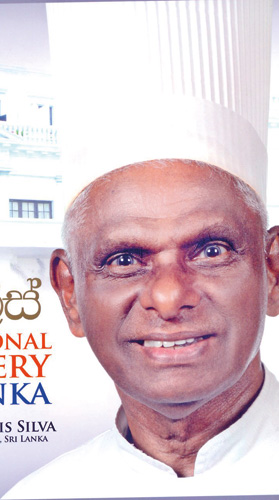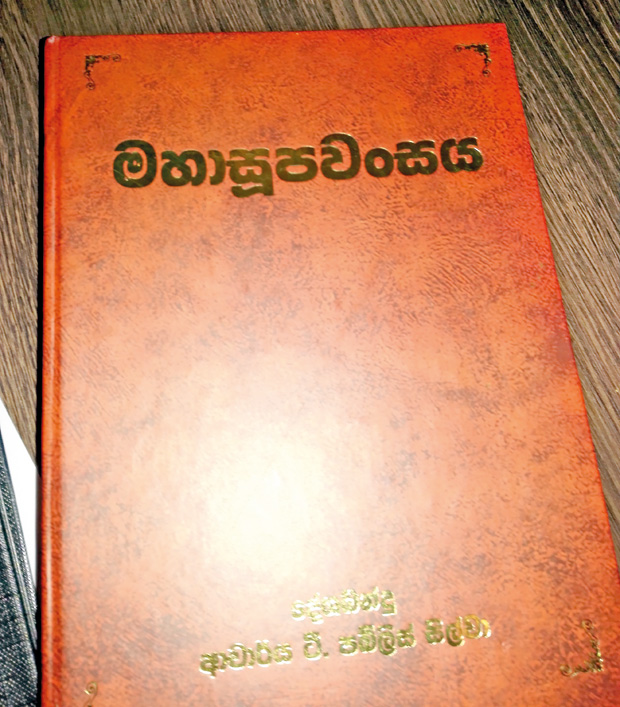Reply To:
Name - Reply Comment
Last Updated : 2024-04-19 22:36:00
 country built on the traditional food taste, published the book ‘Mahasupavamsaya’ with a detailed account of Sri Lanka’s cuisine. Supavamsaya is expected to be revised at regular intervals with the addition of new chapters on the latest development of Sri Lanka’s culinary affairs. In an interview with Daily Mirror, Mr. Silva outlines the reasons for him to compose this book and uniqueness of the country’s food and cooking ingredients.
country built on the traditional food taste, published the book ‘Mahasupavamsaya’ with a detailed account of Sri Lanka’s cuisine. Supavamsaya is expected to be revised at regular intervals with the addition of new chapters on the latest development of Sri Lanka’s culinary affairs. In an interview with Daily Mirror, Mr. Silva outlines the reasons for him to compose this book and uniqueness of the country’s food and cooking ingredients.
I explored information. I studied some archaeological excavations. I interacted with those academics who were involved in such excavations. I travelled through 29 countries and studied their food cultures. Mahasupavamsaya is a result of all
these activities.
When analyzing the food culture, we have to bear in mind that humans originated in Africa, and then migrated to the rest of the world. I started my task in 1968. All edibles on our soil have herbal  properties. The humans emerged in Africa. They consumed raw meat in the primitive stage. Then, how did they start cooking meat? I was curious to find it using my culinary skills. I gave serious mind to it. In cooking food, fire and water are fundamentally needed. We discovered fire by accident. When early humans needed fire, they experimented the generation of it through various means – by pressing two pieces of rock or wood. If not for that, they should have depended on bushfire. In that prehistoric era, humans would have fled for safety in the event of a bushfire. Otherwise, animals and some of them would have been caught in fire and been charred. When survivors returned, they would have found everything charred. There was nothing left for consumption other than charred animal remains. Out of no choice, they devoured charred remains to find a developed taste. It was easy to snap off chunks and chunks of flesh off charred carcasses. This is the origin of cooking food using fire. That happened by accident in this manner.
properties. The humans emerged in Africa. They consumed raw meat in the primitive stage. Then, how did they start cooking meat? I was curious to find it using my culinary skills. I gave serious mind to it. In cooking food, fire and water are fundamentally needed. We discovered fire by accident. When early humans needed fire, they experimented the generation of it through various means – by pressing two pieces of rock or wood. If not for that, they should have depended on bushfire. In that prehistoric era, humans would have fled for safety in the event of a bushfire. Otherwise, animals and some of them would have been caught in fire and been charred. When survivors returned, they would have found everything charred. There was nothing left for consumption other than charred animal remains. Out of no choice, they devoured charred remains to find a developed taste. It was easy to snap off chunks and chunks of flesh off charred carcasses. This is the origin of cooking food using fire. That happened by accident in this manner.
Then, I asked myself how cooking ingredients came about. I also had my own experience during my teen age. As a teenager born to a family without land and any other property, I, along with others, used to snap off young coconut from palms in nearby gardens and eat. That is a mischievous act. Once, a piece of coconut dropped from my hand on the sandy beach near my house. I washed it with seawater. Amazingly, I had a different taste. Salt is the first cooking ingredient. It is a food savoury. Today, no food can be cooked or made without salt. We can disregard other ingredients, but not salt. In simple, fire, water and salt are basic requirements for cooking food. I had a great chance of travelling in Africa. I wanted to experience their food culture. I tasted some food prepared for me. It is a sticky food. They called it’ pup’. It is nothing but what we call ‘Thalapa’. Theirs was made of wheat flour. We have Kurakkan Thalapa. You can notice how the food cultures are inter-related. In Sri Lanka, we had agriculture even in 9th century BC. We had cultivated cotton. After the arrival of Prince Vijeya, there was erosion of the original indigenous culture. In my book, I have extensively dealt with how food culture eroded after the arrival of Prince Vijeya. We have embraced alien food cultures since then.
It will be revised every two years with the inclusion of new chapters detailing out developments in our culinary sphere. Like Mahawamsa, it will continue to be chronicled by the generations to come. We have published the pictures of all food stuffs grown on this soil. Also included are the photos of all edible fish varieties grown in seawater and freshwater. One can find details about all our traditional yam and fruit varieties in the book published recently.
Our food culture is unmatched by any. It is unique. We have to prove it. We use 42 cooking ingredients containing properties with herbal value. Ours is exclusive because we do not use ingredients which are artificial or made of animal oil. In other countries, animal oil or fat is also used.
 "After the importation of sugar and wheat, it made a lethal health blow to our people. We inherited non communicable diseases. As for Kavum, we cannot, in fact, trace its origin other than going by some hear-say"
"After the importation of sugar and wheat, it made a lethal health blow to our people. We inherited non communicable diseases. As for Kavum, we cannot, in fact, trace its origin other than going by some hear-say"It may be due to our religious inclinations. We are Buddhists. With the advent of Buddhism after the arrival of Arahat Mahinda, the country underwent a major social transformation.
We talked about how we started cooking. In Ayurveda, we find great historic details. This appears to have developed in conformity with such Ayurvedic concepts. When we are sick, we brew some corriander seeds in hot water and drink it. We use cinnamon as a herb for lowering the sugar level in the body. Around 150 years ago, we used Kaluduru as an ingredient. My view is that we derived the use of cooking ingredients from Ayurveda.
Our indigenous food culture suffered after the arrival of Prince Vijeya. Later, our country was invaded by foreign powers. We inherited some food varieties from those invaders. Our indigenous identity was lost. Today, chilli paste has become an essential component for some when taking their meals. On a festive occasion, our people tend to make sure that Chopsuey is available. They try to have fried rice somehow. They do not know the meaning of it though. They mistakenly call vegetable rice ‘fried rice’. We embraced alien cuisine casting aside ours. I think this happened after the Portuguese and British invasion. Some of our people compromised their identity for the sake of titles conferred.
That is a good question. At village level, we have traditional family functions to mark weddings or events of girls attaining age. We also conduct ritualistic ceremonies. We normally make two or three vegetable curries on such occasions to host guests and relatives. We are used to fry Papadam. In the past, we mostly made Kiribath and Kavum. With the arrival of the Portuguese, it changed. We started making cake even for birthdays. What we lost is our traditional food culture.
Eating cake on birthdays is not our culture. We have embraced it from elsewhere. We only ate Kiribath and Kavum. We have heard of Kiribath made by Sujatha to be offered to the Buddha prior to his attainment of Buddha-hood. She made it with fresh milk. That is the history of Kiribath we can think of. Whenever there is any almsgiving at a village household, fellow villagers contribute to it with various food stuffs. This practice is always there.
It is unfounded criticism. We did not have either sugar or wheat for preparing sweetmeats. In fact, we imported them. After the importation of sugar and wheat, it made a lethal health blow to our people. We inherited non communicable diseases. As for Kavum, we cannot, in fact, trace its origin other than going by some hear-say. Kavum, Kiribath and Kokis are traditional sweetmeats. Kokis is not ours. Aasmi is yet another sweetmeat introduced to us. However, only we have Aasmi today, in the whole world. It is not found elsewhere in the world.

Add comment
Comments will be edited (grammar, spelling and slang) and authorized at the discretion of Daily Mirror online. The website also has the right not to publish selected comments.
Reply To:
Name - Reply Comment
On March 26, a couple arriving from Thailand was arrested with 88 live animal
According to villagers from Naula-Moragolla out of 105 families 80 can afford
Is the situation in Sri Lanka so grim that locals harbour hope that they coul
A recent post on social media revealed that three purple-faced langurs near t